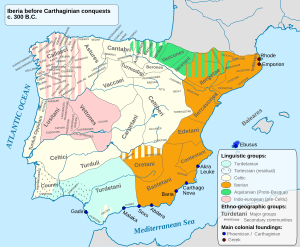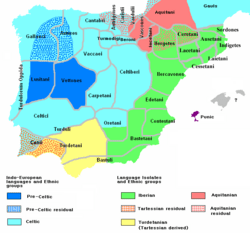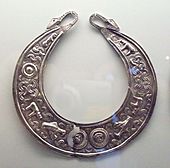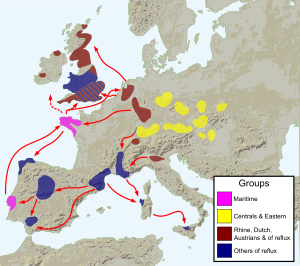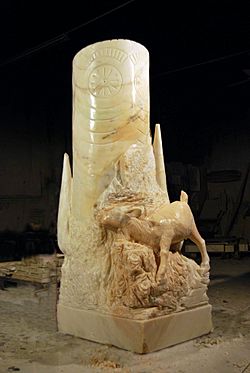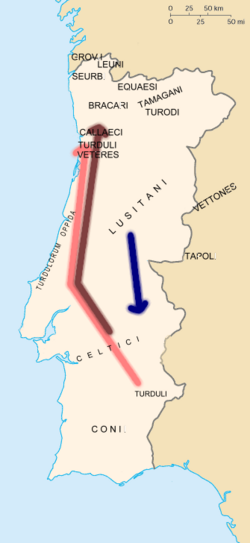Lusitanians facts for kids
The Lusitanians were an ancient people who lived in the western part of the Iberian Peninsula. This area is now mostly central Portugal and parts of Extremadura and Castilla y Leon in Spain. They spoke an Indo-European language. After the Roman Republic conquered their land, it became a Roman province called Lusitania.
Contents
History of the Lusitanians
Where Did They Come From?
Historians have different ideas about where the Lusitanians came from. Some ancient writers, like Frontinus, thought they were related to the Celtiberians, another group in the Iberian Peninsula. The historian Diodorus Siculus even called them "the bravest of all similar to the Cimbri", which was another Celtic tribe.
However, based on what archaeologists have found, the Lusitanians might have been a group that lived there before the Celts arrived. They probably adopted some Celtic customs and ideas because they lived close to Celtic people. Other Roman writers like Pliny the Elder saw them as different from their Celtic neighbors.
The Roman province of Lusitania changed its borders over time. At first, it included more land, but later it became smaller, with its northern border along the Douro River.
Fighting Against Rome
The Lusitanians were known as strong warriors. They even fought as mercenaries for Carthage against Rome during the Second Punic War (218-201 BC). They were skilled at riding horses and raiding enemy lands.
Later, starting in 193 BC, the Lusitanians began fighting the Romans directly in Hispania. In 150 BC, a Roman leader named Servius Galba tricked them. He promised them peace but then attacked, killing 9,000 Lusitanians and selling 20,000 more into slavery.
This terrible event made a Lusitanian leader named Viriathus very angry. Three years later, in 147 BC, he became the leader of the Lusitanians. Viriathus was a brilliant fighter and caused a lot of trouble for the Romans. He became a hero to his people.
Sadly, in 139 BC, Viriathus was betrayed and killed by three of his own companions. They were bribed by a Roman official. However, when these traitors went to get their reward from the Romans, the Roman Consul Quintus Servilius Caepio had them executed. He famously said, "Rome does not pay traitors."
Becoming Roman
After Viriathus died, the Lusitanians continued to fight for a while under a new leader named Tautalus. But over time, they slowly started to adopt Roman culture and the Latin language. Their cities eventually gained the same rights as Roman cities, and many Lusitanians became Roman citizens. This process is called Romanization.
Lusitanian Culture
It's tricky for historians to fully understand Lusitanian culture and language. Some think it was mainly a culture that existed before the Celts, but with a lot of Celtic ideas mixed in. Others believe it was mostly a Celtic culture that had strong influences from the older local people, especially those linked to the Beaker culture.
Lusitanian Religion
The Lusitanians believed in many different gods, which is called polytheism. They would offer sacrifices, sometimes animals, to their gods. They also made simple sculptures of their gods and warriors.
Endovelicus was one of their most important gods. Some scholars think his name might come from the Basque language, but others believe it's a Celtic word meaning "Very Good God." This is similar to the Irish god Dagda. Even the Romans started to worship Endovelicus because they believed he could protect them. His worship spread across the Iberian Peninsula and lasted until the 5th century. He was seen as a god of public health and safety.
Another important goddess was Ataegina, who was very popular in the south. She was the goddess of rebirth (like spring), fertility, nature, and healing. The Romans connected her with their goddess Proserpina.
Lusitanian beliefs were very much influenced by, or connected to, Celtic mythology. Other gods often mentioned in ancient writings include Bandua (a god often linked to specific places) and Nabia, a goddess of rivers and streams.
Lusitanian Language
The Lusitanian language was part of the Indo-European family, just like English, Spanish, and Latin. However, experts still debate exactly how it fits into that family.
Some believe it was a "para-Celtic" language, meaning it was very similar to Celtic languages and shared many words with them. Another idea is that it was more closely related to Italic languages (like Latin). There's also a theory that it was a unique branch of Indo-European languages, separate from both Celtic and Italic, that developed very early on.
Lusitanian Tribes
The Lusitanians were not one single country but a group of different tribes. These tribes lived between the Douro and Tagus rivers in what is now central Portugal and parts of Spain.
Each tribe had its own land and was independent, made up of smaller family groups called clans. However, they shared a common culture and a sense of being one people. Each tribe had its own leaders and a tribal aristocracy, many of whom were skilled warriors.
The different Lusitanian tribes would usually only unite when there was a big threat from outside, like when the Romans tried to conquer their land. This is when Viriathus became the single leader of all the Lusitanian tribes. Before him, other important chiefs like Punicus, Caucenus, and Caesarus also led the tribes in fighting against the Romans.
Some of the known Lusitanian tribes included:
- Arabrigenses
- Araocelenses
- Aravi
- Coilarni
- Interamnienses
- Lancienses
- Meidubrigenses
- Paesuri
- Palanti
- Petravioi
- Tangi
- Talures
- Veaminicori
- Vissaieici
Historians are still trying to figure out if some other tribes, like the Turduli, were also Lusitanian or if they were different Celtic peoples.
Lusitanian Warfare
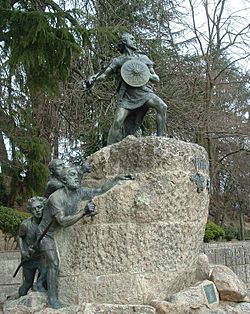
The Lusitanians were famous for their skill in guerrilla warfare, which means using surprise attacks and quick movements instead of big, open battles. They were very good at fighting in mountainous areas.
Their main weapons included hooked javelins (spears) made of iron, swords, and helmets, similar to those used by the Celtiberians. They were quick and agile warriors. They would throw their darts from a distance and were very accurate. After wounding their enemies, they would often chase them down and cut off their heads.
In times of peace, they had a special dance that showed off their agility. In war, they would march together in rhythm before charging into battle. The Roman historian Appian wrote that when the Romans attacked Lusitania after Viriathus died, the Lusitanian women fought bravely alongside their men.
Lusitanians Today
Today, the word "Lusitanians" is sometimes used by Portuguese writers as a way to refer to the Portuguese people. Similarly, the word Lusophone is used to describe anyone who speaks Portuguese or shares the cultural traditions of Portuguese-speaking countries.
This includes countries like Portugal, Brazil, Angola, Mozambique, Cape Verde, São Tomé and Príncipe, Guinea Bissau, Macau, and Timor-Leste.
See also
 In Spanish: Lusitanos para niños
In Spanish: Lusitanos para niños
- History of Portugal
- Timeline of Portuguese history
- Beira Alta
- Beira Baixa
- Ribatejo
- Alentejo
- Extremadura
- Emerita Augusta, capital of the Roman province of Lusitania
- Hispania
- Lusitania (Roman province)
- Pre-Roman peoples of the Iberian Peninsula
- List of Celtic tribes
- List of Celtic place names in Portugal
- List of Ancient Peoples of Portugal
- National Archaeology Museum (Portugal)
- Roman Empire
 | Bayard Rustin |
 | Jeannette Carter |
 | Jeremiah A. Brown |


